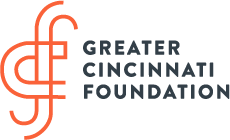Meet Will Woodward
Chief Financial Officer Will Woodward is a two-time graduate of Miami University, with a bachelor’s degree in accounting and an MBA in finance. A Cincinnati native, he lives in Loveland with his wife and three young children.
Share details of your personal and professional background that helped to guide your path to Greater Cincinnati Foundation (GCF).
My mom was a philosophy professor at the University of Cincinnati; my sister followed Mom and went into teaching. My dad was an accountant for the IRS for over 30 years, and I ended up following in his footsteps by going into the accounting field. I’ve always been a math-type person, so it was natural for me. My first job out of college was working for Deloitte, one of the “Big Four” accounting firms here in Cincinnati, which provided me with a strong foundation in the accounting side of the house. But my passion was more in finance, so after five years at Deloitte I had the opportunity to take a position in operational finance with Mercy Health. Initially I was the head of finance for Mercy Anderson Hospital, and six months later they added Mercy Clermont Hospital. I got to work inside the walls of a hospital, which really gave me my first taste of what it’s like to lead finance for an organization. I had an opportunity to look at a wide array of budgets, and we put together many financial projections including the new $80 million tower at Mercy Anderson Hospital.
Then I was recruited to the start-up company RushCard, the largest privately-held pre-paid debit card company in the US, which was then located in Blue Ash. It was co-founded by Russell Simmons (rap music producer and co-founder of Def Jam Recordings). They created the first-ever Visa pre-paid debit card, but by the time I got there it was a pretty large organization. My role was the entire financial purview — accounting, finance and HR, which really gave me a taste of how to grow an organization. We doubled the size of my team in the time I was with the organization. We operated as the “bank” for many of our customers, most of whom tended to live below the poverty line.
We were in the process of selling the business when I got a call about GCF. It was a great natural progression in terms of my next step. I’m a big believer that things happen for a reason. During the interview process I had an opportunity to meet a lot of our board members, and they were looking for someone who had a for-profit mindset in terms of the skills and capabilities that would help bring to GCF. Ellen and Dora have been in the nonprofit world for a long time, and so it was a great fit of our different backgrounds to be able to facilitate growth in making an impact. When I came Ellen had been here about two years — it was really exciting time, and I think we have an amazing board.
What are your professional and community affiliations, and how do they inform your role at GCF?
On the professional side, I am a CPA, so I’m a member of the Ohio Society of CPAs and the American Institute of Certified Public Accountants. I’m a Charter Global Management Accountant as well. Because I have young children (three kids four and under to be specific) I’m mindful of prioritizing my time. I recently concluded about 10 years of service with the Literacy Network of Greater Cincinnati, a cause that has always been a passion for our family. My wife and I are also in a number of groups affiliated with our church.
Who or what is your inspiration, and in what ways has that driven your passion for GCF’s mission?
Probably my biggest source of inspiration is my parents, for different reasons. My dad was the coach, a person who was always the provider for our family. My mom had an incredible life — she was a college professor until she got sick when I was a young child and had to give that up. Later she went back to graduate school and became a social worker at Talbert House working with people who had drug and alcohol addictions; after that she did prison ministry, mentoring women at local prisons and helping them get their GEDs. She instilled in me a sense of giving back, of making sure that I am leaving our community in a better place than I inherited it. I’ve always tried to carry that forward and that’s what led to my through-line of mission-based jobs that ultimately led me to GCF. On the professional side, I’ve had really good mentors. The people I’ve appreciated the most are those who have taught me something and I’ve tried to carry that forward, making sure that I’m teaching and giving back as much as I possibly can.
What are three things about you that most people don’t know?
One of my passions is that I’ve always loved the idea of an entrepreneurial-type business. My wife and I got into real estate back in 2011 and 7 years later we’ve flipped five houses and have 12 rental properties. I love being able to offer nice houses that people can feel comfortable living in and seeing the transformation when they are complete. It’s another aspect that ties in with the mission of this organization. At GCF we’re looking at how can we do some really big things in the affordable housing space, and I hope that I can add some value in ways that could impact a lot of lives.
I love playing poker. I love the strategy behind it and I have played for a long time in a number of poker leagues. I’ve come within inches, twice, to making the (World Series of Poker) Main Event — the largest poker tournament in the world.
I’ve had the benefit of meeting two of the greatest individuals of all time in their respective sports. I grew up in Roselawn, and Muhammad Ali’s brother lived across the street. One day Muhammad Ali pulled up in a big RV, and the whole street got to come out and meet him. I also met Secretariat — my parents took me down to a horse farm in Lexington to meet him. I also had the chance to play against a grand master in chess in New Orleans.
What do you like most about working at GCF?
What I’ve enjoyed the most is the people, both inside and outside the walls of this great organization, that I’ve been fortunate enough to meet. At GCF we tend to come across a wide spectrum of people. We’ve got great employees, and we’re also interacting with fantastic donors, professional advisors and a lot of really important nonprofits. The greatest thing, for me — which I said coming in the door and I say it now — is that I really want to be at an organization about which I can tell my kids one day, “Daddy was helping to make Greater Cincinnati better.”

